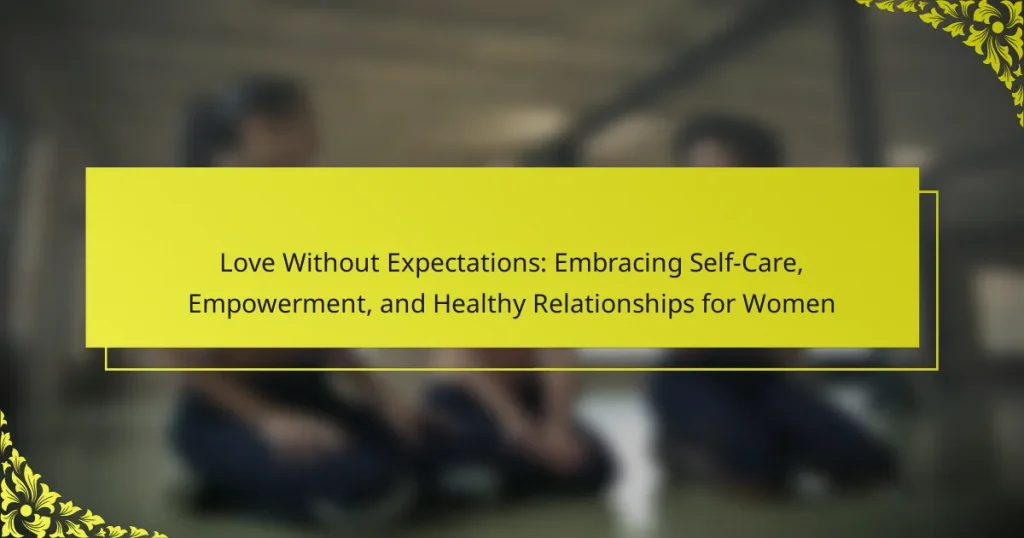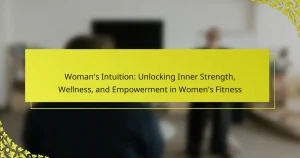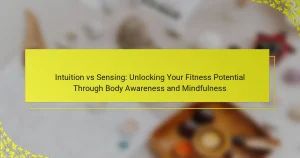Embracing love without expectations empowers women to prioritise self-care and build healthier relationships. This article explores the importance of self-care in fostering emotional resilience, setting boundaries, and enhancing communication. It addresses the unique challenges women face in relationships and offers strategies to cultivate mutual respect and understanding. By focusing on personal growth and emotional intelligence, women can create deeper connections free from unrealistic expectations.
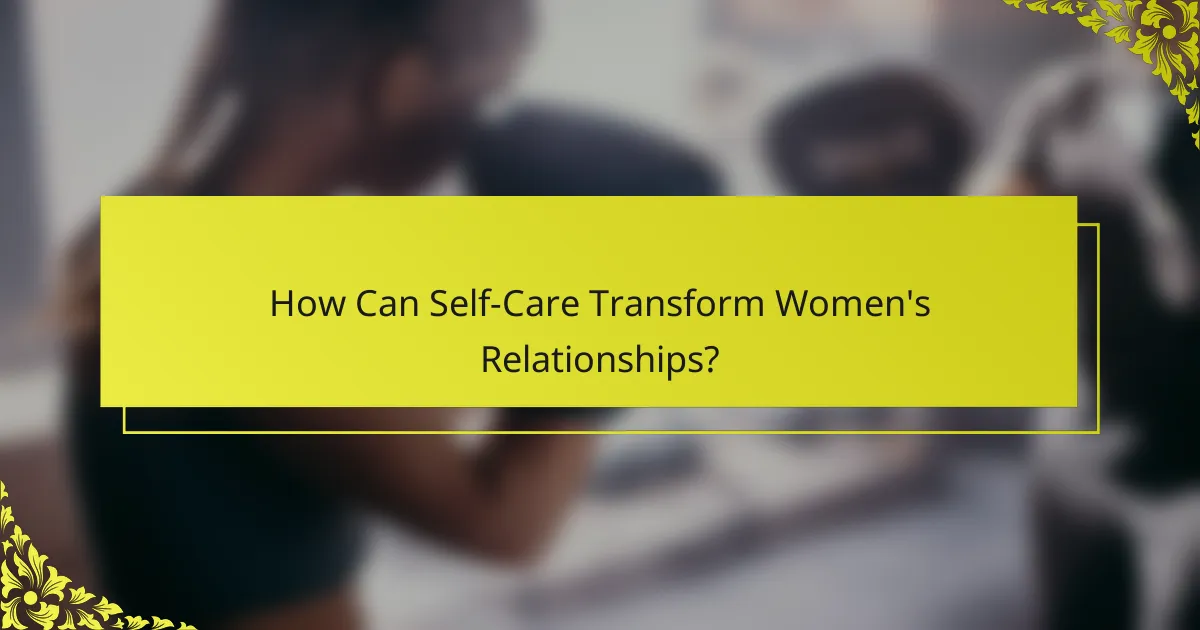
How Can Self-Care Transform Women’s Relationships?
Self-care can significantly enhance women’s relationships by fostering empowerment and emotional resilience. Prioritising self-care allows women to establish healthy boundaries, communicate effectively, and nurture their emotional well-being. This transformation leads to deeper connections, mutual respect, and reduced dependency on external validation. As women embrace self-care, they cultivate a sense of self-worth that positively influences their interactions, creating a foundation for love without expectations. Ultimately, empowered women contribute to healthier, more fulfilling relationships.
What are the Essential Self-Care Practices for Women?
Essential self-care practices for women include mindfulness, physical activity, healthy eating, and setting boundaries. These practices empower women to cultivate emotional resilience and foster healthy relationships. Mindfulness enhances self-awareness and reduces stress, while regular physical activity boosts mood and energy levels. A balanced diet supports overall well-being, and establishing boundaries promotes self-respect and personal space. Engaging in these practices not only nurtures self-love but also strengthens connections with others, creating a foundation for healthy relationships.
How to Create a Personalised Self-Care Routine?
To create a personalised self-care routine, identify your unique needs and preferences. Start by assessing your emotional, physical, and mental health. Incorporate activities that empower you, such as journaling, meditation, or exercise. Schedule regular self-care time, ensuring it fits your lifestyle. Adapt your routine based on what brings you joy and relaxation, fostering healthy relationships along the way.
What Role Does Nutrition Play in Self-Care?
Nutrition plays a crucial role in self-care by enhancing physical and mental well-being. A balanced diet supports energy levels, mood stability, and overall health, empowering women to engage in healthy relationships. Proper nutrition provides essential nutrients that foster resilience and self-acceptance, vital for personal empowerment. Research shows that nutrient-rich foods can reduce anxiety and depression, further reinforcing the importance of nutrition in self-care practices.
How Does Empowerment Influence Relationship Dynamics?
Empowerment significantly enhances relationship dynamics by fostering self-respect and healthy boundaries. When women embrace empowerment, they cultivate self-care, which leads to more balanced and fulfilling relationships. Empowered individuals communicate their needs clearly, reducing misunderstandings. This shift encourages mutual respect and support, creating a positive feedback loop that strengthens connections. Additionally, empowered women are more likely to engage in relationships that align with their values, promoting authenticity and satisfaction.
What are the Signs of an Empowered Woman?
An empowered woman demonstrates confidence, self-awareness, and resilience. She sets boundaries, values her needs, and fosters healthy relationships. Key signs include assertiveness, independence, emotional intelligence, and a commitment to personal growth. Empowered women embrace self-care and prioritise their well-being.
How to Foster Empowerment in Daily Life?
To foster empowerment in daily life, prioritise self-care, set healthy boundaries, and cultivate supportive relationships. Embrace practices that boost self-esteem and encourage personal growth. Engage in activities that align with your values and interests, promoting a sense of autonomy. Recognise that empowerment stems from within; practice self-compassion and resilience.

What Unique Challenges Do Women Face in Relationships?
Women face unique challenges in relationships, including societal expectations, communication barriers, and emotional labour. These obstacles can hinder personal empowerment and self-care. For instance, women often feel pressured to prioritise their partner’s needs over their own, which can lead to resentment. Additionally, women may encounter difficulties in expressing their emotions due to fear of being perceived as overly emotional. Understanding these challenges is essential for fostering healthy relationships that support both self-care and mutual respect. Embracing empowerment strategies can help women navigate these complexities effectively.
How Can Women Overcome Societal Expectations?
Women can overcome societal expectations by prioritising self-care, asserting their empowerment, and fostering healthy relationships. Embracing self-care allows women to nurture their well-being, which is essential for personal growth. Empowerment comes from recognising one’s worth and capabilities, enabling women to challenge norms. Healthy relationships, founded on mutual respect and understanding, provide support in navigating societal pressures. By focusing on these aspects, women can cultivate a fulfilling life aligned with their values.
What Rare Attributes Contribute to Healthy Relationships?
Rare attributes that contribute to healthy relationships include mutual respect, emotional intelligence, and open communication. These qualities foster trust and understanding, allowing individuals to navigate challenges together. Additionally, vulnerability enhances connection, enabling partners to share their true selves without fear. Embracing individuality within the relationship nurtures personal growth, ultimately benefiting the partnership.

How Can Women Build Healthy Boundaries?
Women can build healthy boundaries by prioritising self-care, communicating openly, and recognising their needs. Establishing boundaries fosters empowerment and strengthens relationships. Start by identifying personal limits, then express them clearly to others. Practice saying no without guilt, and reflect on interactions to ensure boundaries are respected. Embracing self-care routines enhances emotional resilience, making it easier to maintain these boundaries.
What are the Key Steps to Setting Boundaries?
To set boundaries effectively, identify your needs, communicate clearly, and remain consistent. Start by recognising what behaviours you find unacceptable. Next, express your limits directly and respectfully to others. Finally, reinforce your boundaries by following through on consequences if they are crossed.
How to Communicate Boundaries Effectively?
To communicate boundaries effectively, express your needs clearly and assertively. Use “I” statements to convey feelings without blaming others. Active listening fosters understanding, while consistency in your message reinforces your limits. Empowerment in self-care enhances your ability to maintain healthy relationships.
What are Common Mistakes in Boundary Setting?
Common mistakes in boundary setting include failing to communicate needs clearly, neglecting self-awareness, being overly accommodating, and not following through with consequences. These errors can lead to resentment and unhealthy dynamics in relationships. Embracing self-care and empowerment is essential for women to establish and maintain healthy boundaries.

What Practices Enhance Emotional Intelligence in Relationships?
Practices that enhance emotional intelligence in relationships include self-awareness, active listening, and empathy. These practices foster deeper connections and understanding.
Self-care is vital; it allows individuals to recharge emotionally, leading to healthier interactions. Empowerment through setting boundaries promotes respect and mutual growth.
Engaging in open communication nurtures trust and clarity. Regularly reflecting on one’s emotions and responses can enhance relational dynamics.
Lastly, practicing gratitude and appreciation strengthens bonds, making relationships more resilient and fulfilling.
How Can Emotional Intelligence Improve Communication?
Emotional intelligence significantly enhances communication by fostering empathy and understanding. It allows women to express their feelings authentically and respond to others with compassion. This leads to healthier relationships, as emotional awareness helps to navigate conflicts and build trust. Women who cultivate emotional intelligence often experience improved self-care and empowerment, ultimately enriching their connections with others.
What Techniques Help Develop Emotional Intelligence?
Practicing self-awareness, empathy, and effective communication enhances emotional intelligence. Techniques include mindfulness meditation, journaling emotions, and engaging in active listening. These practices foster self-care and empower women to build healthy relationships. Additionally, seeking feedback from trusted friends can provide unique insights into emotional responses.
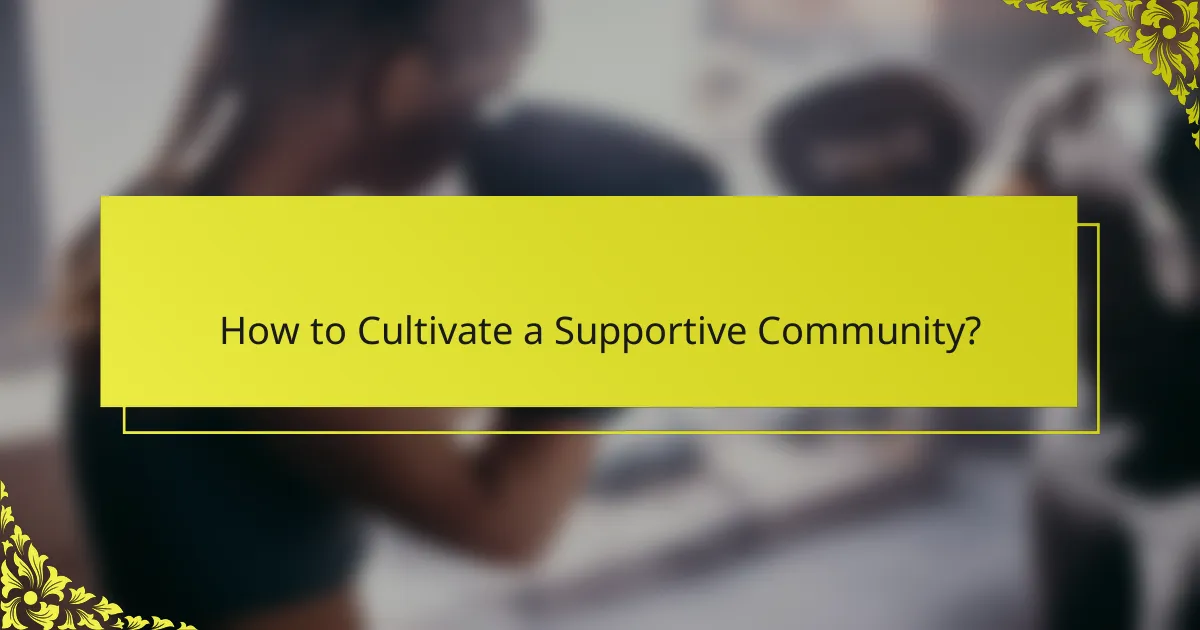
How to Cultivate a Supportive Community?
To cultivate a supportive community, prioritise open communication and mutual respect. Foster an environment where women feel empowered to share their experiences and challenges. Encourage collaboration through group activities that promote self-care and personal growth. Establish clear boundaries to maintain healthy relationships, ensuring everyone feels valued and heard.
What are the Benefits of a Strong Support Network?
A strong support network enhances emotional well-being, resilience, and personal growth. It fosters a sense of belonging, reduces stress, and promotes healthier relationships. Women with robust support systems experience increased self-esteem and empowerment. Studies indicate that social connections can significantly improve mental health outcomes.
How to Find Like-Minded Women for Support?
To find like-minded women for support, engage in communities that prioritise self-care and empowerment. Consider joining local women’s groups, online forums, or workshops focused on healthy relationships. Networking at events related to personal development can also connect you with supportive individuals. Seek out social media platforms that foster positive interactions among women, as these spaces often cultivate meaningful connections.
What are the Best Practices for Nurturing Relationships?
To nurture relationships effectively, focus on self-care, empowerment, and open communication. Prioritise your well-being, set healthy boundaries, and engage in active listening. Establish trust through honesty and vulnerability, fostering deeper connections. Celebrate each other’s successes and provide support during challenges to strengthen the bond.

What Expert Insights Can Help Women Embrace Love Without Expectations?
Embracing love without expectations involves prioritising self-care and empowerment. Women can cultivate healthy relationships by fostering self-awareness, setting boundaries, and practising open communication. Engaging in activities that enhance self-esteem, such as mindfulness and personal development, creates a strong foundation for love. Building connections based on mutual respect and understanding encourages deeper emotional bonds without the burden of unrealistic expectations.
How to Apply Self-Care Principles in Everyday Life?
To apply self-care principles in everyday life, focus on nurturing your emotional, physical, and mental well-being. Prioritise activities that foster self-love, such as setting boundaries and engaging in hobbies. Incorporate mindfulness practices to enhance self-awareness and reduce stress. Schedule regular time for self-reflection and relaxation, allowing space for personal growth. Surround yourself with supportive relationships that encourage empowerment and healthy interactions.
What Common Mistakes Should Women Avoid in Relationships?
Women should avoid losing their identity and neglecting self-care in relationships. Prioritising personal well-being fosters empowerment and strengthens connections. Common mistakes include compromising values, ignoring red flags, and over-relying on partners for happiness. Maintaining independence and open communication is essential for healthy relationships. Embracing self-care not only enhances individual growth but also enriches partnerships.
What are the Top Tips for Empowerment and Self-Love?
To empower yourself and cultivate self-love, prioritise self-care, set healthy boundaries, and practise positive affirmations. Engage in activities that nourish your mind and body, and surround yourself with supportive relationships.
1. Prioritise self-care: Dedicate time for activities that rejuvenate you.
2. Set healthy boundaries: Learn to say no to protect your energy.
3. Practise positive affirmations: Reinforce your self-worth daily.
4. Engage in self-reflection: Understand your needs and desires.
5. Surround yourself with positivity: Choose relationships that uplift you.
